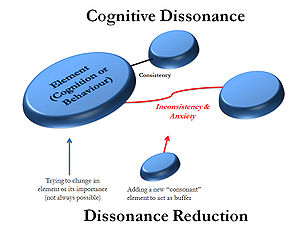 |
| A diagram of cognitive dissonance theory. Dissonance reduction can be accomplished in various ways, broadly including the addition of more, consonant elements, or else changing the existing elements. (Photo credit: Wikipedia) |
Do those people *really* knew that all along? Doubt it. It's probably "retrospective falsification".
The short definition: the person is rewriting his/her memory to fit his/her current agenda / thoughts in order to resolve any cognitive dissonance.
The simplest example: married couple now divorcing bitterly telling each other "I never loved you!" Clearly, they were in love enough to get married, but now they're divorcing, there's a bit of retrospective falsification, to justify their current agenda (bitter divorce).
Usually this is "fudging" of details. Someone who was there at a significant event in history embellishes his or her role in it, or added details, and much more.
Victims of scams are often guilty of retrospective falsification, by ignoring any and all evidence of suspicious circumstances, even if they themselves brought it up.
Memory is never exact, as human memory records experiences, not exact events. Every time you access the experiences, you deepen them and facilitate their recall later, while the rest of the "irrelevant details" fades into the background. When you recall events later, the little details are RECONSTRUCTED by your mind using OTHER INFORMATION available, and that is going to depend on your current circumstances and more recent thoughts.
When a victim of a scam tries to recall why did s/he join the scam, s/he is not going to recall the doubt, the contemplation, and the research, but instead, recall circumstances under which s/he joined. It could be a great meeting where s/he met the "leaders", could be a big convention and live band and dancers played on stage, could be special recognition of a friend / family member for certain accomplishments, and so on, but s/he is not going to recall reading the fine print (or its verbiage) on the joining application and so on.
And when the mind does not have the details, the details are reconstructed.
This is especially apparent in person-to-person scams, i.e. "affinity scams" where the victim knows the scammer relatively well. When the victim recalls things about that person, s/he is going to remember how nice the perp was, and only a very close introspection is going to reveal signs of trickery.
The victim was convinced to trick himself or herself by forgetting the bad parts (avoiding "negativity), and remember only the good parts.
http://skepdic.com/retfalse.html






No comments:
Post a Comment